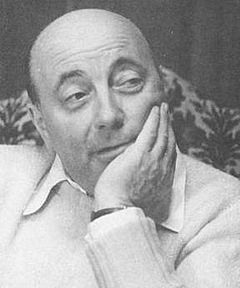Marcel Carné facts for kids
Quick facts for kids
Marcel Carné
|
|
|---|---|
 |
|
| Born | 18 August 1906 |
| Died | 31 October 1996 (aged 90) |
| Years active | 1936–1976 |
Marcel Carné (born August 18, 1906 – died October 31, 1996) was a famous French film director. He was a very important person in a film style called poetic realism. This style often showed sad or serious stories about everyday life.
Some of Carné's most famous movies include Port of Shadows (1938), Le Jour Se Lève (1939), The Devil's Envoys (1942), and Children of Paradise (1945). Many people consider Children of Paradise to be one of the greatest films ever made.
Contents
Early Life and Career Beginnings
Marcel Carné was born in Paris, France. His father was a cabinet maker. Marcel's mother passed away when he was only five years old.
He started his career by writing about movies. He became the editor of a weekly magazine called Hebdo-Films. He also worked for other film magazines like Cinémagazine and Cinémonde from 1929 to 1933.
During this time, he also worked on silent films. He was a camera assistant for director Jacques Feyder. By the time he was 25, Carné had already directed his first short film. It was a documentary called Nogent, Eldorado du dimanche (1929). He continued to help Feyder and René Clair on several films.
Working with Jacques Prévert
In 1936, Jacques Feyder went to work in England. He helped Marcel Carné take over his film project, Jenny. This movie was the start of a very successful partnership. Carné began working with the poet and screenwriter Jacques Prévert.
Their teamwork lasted for over ten years. Together, Carné and Prévert created their most memorable films. They were key figures in the poetic realism film movement. This style often featured stories with a sense of fate or tragedy.
Many experts say that Marcel Carné's Le Quai des brumes (1938) and Le Jour Se Lève (1939) are the best examples of this film style.
Filming During World War II
During World War II, France was occupied by Germany. Marcel Carné continued to make films in the Vichy zone. This was a part of France that was not directly controlled by Germany.
Carné cleverly found ways to make movies even with strict rules. Several people on his film team were Jewish, like Joseph Kosma and set designer Alexandre Trauner. They faced many challenges during this time.
Under these difficult conditions, they made Carné's most famous film. It was called Les Enfants du paradis (Children of Paradise, 1945). This movie was released after France was freed from occupation. In the late 1990s, many French critics voted it the "Best French Film of the Century."
Later Career and Legacy
After the war, Carné and Prévert tried to make another big film. It was called Les Portes de la nuit. This movie was the most expensive French film ever made at the time. However, critics did not like it, and it did not do well at the box office. This was their last full film together.
By the 1950s, Carné's popularity began to fade. New film critics, who later started the French New Wave movement, often gave more credit to Prévert for their joint films.
Except for his 1958 hit Les Tricheurs, many of Carné's later films were not very successful. They often received negative reviews from the press. In 1958, Carné was the head of the jury at the 6th Berlin International Film Festival. His 1971 film Law Breakers was shown at the 7th Moscow International Film Festival. Marcel Carné made his last film in 1976.
Marcel Carné passed away in 1996 in Clamart, Hauts-de-Seine. He was buried in the Cimetière Saint-Vincent in Montmartre, Paris.
Filmography as director
- Nogent, Eldorado du dimanche (1929, documentary short)
- Jenny (1936)
- Drôle de drame (1937)
- Le quai des brumes (1938)
- Hôtel du Nord (1938)
- Le jour se lève (1939)
- Les visiteurs du soir (1942)
- Les enfants du paradis (1945)
- Les portes de la nuit (1946)
- La fleur de l'âge (1947)
- La Marie du port (1950)
- Juliette ou La clef des songes (1951)
- Thérèse Raquin (1953)
- L'air de Paris (1954)
- Le pays d'où je viens (1956)
- Les tricheurs (1958)
- Terrain vague (1960)
- Du mouron pour les petits oiseaux (1963)
- Trois chambres à Manhattan (1965)
- The Young Wolves (1968)
- Les assassins de l'ordre (1971)
- La merveilleuse visite (1974)
- La Bible (1977, documentary)
See also
 In Spanish: Marcel Carné para niños
In Spanish: Marcel Carné para niños
 | Jackie Robinson |
 | Jack Johnson |
 | Althea Gibson |
 | Arthur Ashe |
 | Muhammad Ali |

